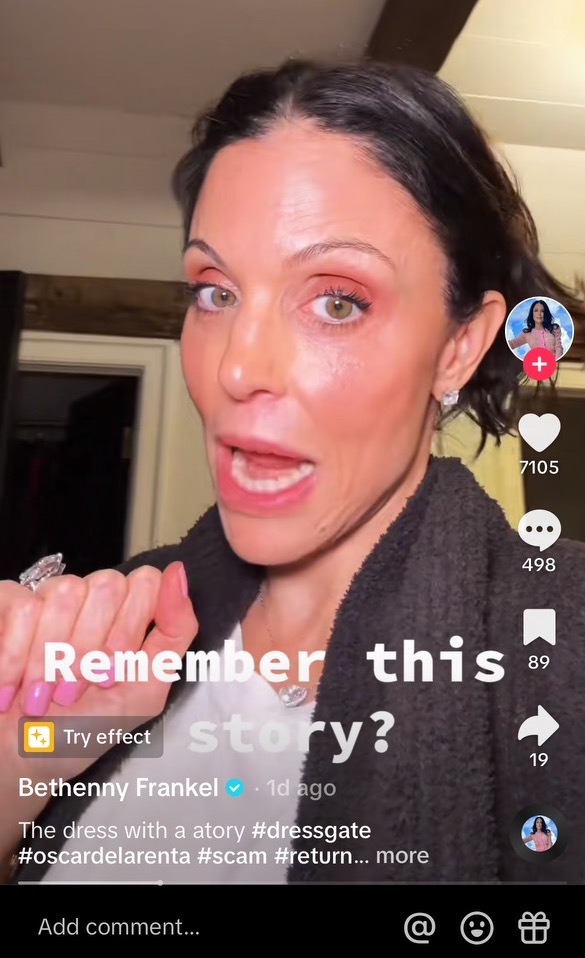
@bethennyfrankel on TikTok
Bethenny Frankel’s Chain Reaction
If Bethenny Frankel fell in a forest, would she make a TikTok letting you know she got up all on her own?
By Davis Dunham
12.12.2023
It is very important to Bethenny Frankel that you know precisely how independent she is. She has built her whole identity on this perceived independence—her ability to drop anyone or anything at any moment and be a-okay. It’s a pattern easy to trace back to a tragic childhood that taught her, by example, not to rely on anyone but herself. Unfortunately for her, this independence—or, more accurately, pseudo-independence—needs an onlooker. In short, if Bethenny Frankel fell in a forest, would she make a TikTok letting you know she got up all on her own?
In the late aughts, the easiest way for a woman with a loud personality to gain notoriety on a national scale was to show up on reality TV. Lucky for Bethenny, Bravo came knocking. After the resounding success of the first Real Housewives franchise, Bravo set its sights on a much bigger animal and hunted for no-nonsense women in the Big Apple (except, of course, the very presence of nonsense was their bread-and-butter).
Quickly, with its structure of real-time footage interspersed with retrospective testimonials, Real Housewives started to highlight the difference between people’s words and actions—who the women showed themselves to be versus who they told the world they were. And these women seemed much more focused on the latter. No matter how many times fashion resale entrepreneur Ramona Singer insisted, in testimonials, that she had absolutely no jealousy for textiles businesswoman Jill Zarin, her money, or her friends in high places, Ramona’s fiercely competitive behavior and regular catty comments towards Jill in the real-time footage showed audiences quite the opposite. Luckily, Ramona, like most successful Housewives, lives in a state of delusion that leaves her own perception of herself and her world unassailable, even when videotapes of her own behavior are shown to her.
Now imagine you arrive in this setting (one that forces you to either cave to public perception or rely almost exclusively on your own) already inclined to discredit any opinions besides yours and ready with a quippy remark to draw all eyes back to you. This is how Bethenny Frankel arrived. She chose an extremely popular TV show that positioned her (not incorrectly) as one of New York City’s most interesting women and used this to launch the incredibly successful Skinny Girl brand, which started by selling Skinny Girl Margarita Mix before branching off into other diet foods. After years of being rejected, she found her niche: the make-it-big-or-die-trying disruptor of the Upper East Side who’s always quick with a comeback (and usually alone).
Years have passed, and Bethenny has fallen out of many relationships—both romantic and platonic. She’s left the show and come back, and she’s done it all with an air of moral, intellectual, and, most of all, business superiority, which she pairs adeptly with a cunning sense for self-deprecation that, despite her “showing” of unchecked ego, “tells” of a true softness inside. However, this near-decade of experience in the public eye blinded her to a key aspect of this quasi-independence, one that she might not have ever noticed in the first place: it requires a viewer. This makes perfect sense when you think about it—at a certain point, the viewer becomes assumed, and though one can show the world they don’t need its attention simply by disappearing, one needs a major platform to tell that to the world.
Though Bethenny is now no longer on reality TV, she is certainly not out of the public eye. She has moved to TikTok and Instagram—what better platforms for someone who wants to launch their face, products, and opinions into the minds of millions without having to cooperate with anyone? On social media, she can film, edit, and upload a video entirely on her own and disregard all reactions to her content if she so chooses, except for those she can use for further content. In this echo chamber of her own opinions, now free from other Housewives, producers, and business partners, Bethenny Frankel has coined herself the “Erin Brockovich” of reality TV. This statement is quite ironic as Brockovich fought for regular people’s right to exist without being poisoned by a large corporation, and Bethenny seems to be fighting for quite irregular people’s privilege to use a large corporation to market their cults of personality to those same downtrodden masses.
But maybe therein lies the rub: does Bethenny realize that success can exist without an opponent and an audience—an enemy to outsmart and viewers to watch her do it? Housewives who find themselves unhappy with their second gig (most, Bethenny included, have primary lines of income or rich husbands) would logically quit the show. But not if their current success is built on viewer engagement, whether positive or negative, and their own reaction back. In this way, Bethenny Frankel is walking clickbait. Even her ostensible self-labeling as Erin Brokovich (credited to an amorphous “they”—perhaps cherry-picked commenters on one of her many TikToks) begs for argument.
Luckily, reaction is what Bethenny does best. She successfully built a career on disguising responses as creation. Putting the myriad “Bethenny Frankel responds to” headlines and RHONY testimonials aside, she even created Skinny Girl in response to the diet culture of the 90s and early aughts. Not that reacting is bad—Skinny Girl filled a niche in a market, and most art comes as a reaction to something—but creating a stir to then cherry-pick which reactions to, well, react to is much like shooting fish in a barrel: it’s unfair to the fish and leaves you surrounded by very hungry people. Perhaps this is why Bethenny has chosen a crusade against the reality TV mechanism as her newest cause: now that she cannot react within it, she will react to it. Unfortunately for her, she cannot react without it.
